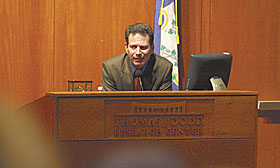Age of Terrorism Demands
New Military Tactics, Says Alumnus
 |
| Journalist Robert Kaplan ’73 gives the 2005 Louis Gerson Foreign Policy Lecture on global security in the year 2010, in Konover Auditorium on March 23. |
|
Photo by Jordan Bender |
The Iraq War will be the last war fought with a conventional army, according to Robert Kaplan, an author and journalist who has spent the past two years embedded with Army Special Forces and Marine units in countries around the world.
Kaplan, who writes for The Atlantic Monthly, said the U.S. Army is in the process of transformation.
“The sad tactical truth of the war in Iraq,” he said, “is that it caught the U.S. Army before it transformed itself from an industrial age juggernaut to the light and lethal guerrilla-style force it will need to be in order to deal with challenges all over the world. … The age of mass infantry warfare is over.”
Kaplan, who graduated from UConn in 1973, has reported from more than 80 different countries and has published 10 best-selling books on international affairs and travel. He was this year’s speaker in the Gerson Foreign Policy Lecture series, addressing a packed auditorium in the Thomas J. Dodd Research Center on March 23.
Although the United States doesn’t have an empire in the conventional sense, he said, its goals, and the challenges and frustrations it faces around the world, are similar to those of great powers throughout history.
U.S. troops are active in 70 to 80 countries, he said: “The expanse of our military empire is extraordinary.”
He compared modern warfare to “the days of fighting Indians.” He said today’s threats come from small clusters of combatants. The Army was trained to fight other armies and other soldiers, but now there are no armies per se. It is fighting warriors, he said.
“We were all geared for fighting and winning the Cold War,” he said. “We are ill-equipped to deal with the new challenges.”
The current form of conflict – terrorism – empowers small groups of people, he noted, who can do a lot of damage. Just a handful of people can destroy a city, he said. “It’s quite something to see a whole platoon of Humvees that are equipped to the hilt reduced to fear by one old, corroded, rusty bicycle that someone identified as probably having a bomb on it.”
Kaplan said U.S. forces have learned that “the best way to kill terrorists is not by killing them but by winning over the local population, and having them deal with them.”
The Army took this approach with the terrorists implicated in the first World Trade Center bombing. They sent in small teams to the Philippines to provide medical, dental, and veterinarian assistance, and build relationships with the community that enabled them to flush out the terrorists. “When you treat a child, the parents turn over a lot [of information],” he said.
The approach is termed “unconventional war” he said, and it covers “all the ways a war can be won without killing people,” including humanitarian work such as the recent tsunami relief operation.
The distinction between humanitarian and military operations is becoming blurred. The Navy’s investment in small seacraft for landing commando units in the middle of the night is what enabled the U.S. to be so effective after the tsunami, he noted.
Kaplan said the U.S. base in Djibouti in the Horn of Africa “provides a paradigm” for how the U.S. military operates. The base, with about 1,400 Marines and Special Forces, is the center for operations in Yemen, Sudan, northern Kenya, Ethiopia, and northern Uganda, he said.
The Army sends out small teams of half a dozen men and women to find out how they can help the villagers. In return, they ask the local people to assist in locating terrorists who have gone underground in the area.
These are low-cost operations, he said. “With small amounts of money, small units, and rarely with a gun, the U.S. military is carrying out vast humanitarian intelligence operations.”
The skills needed to combat terrorism differ from those required by a large standing army, Kaplan said. Former state troopers, anti-drug officers, teachers, and psychologists all have a role to play. Language, diplomatic, and community policing skills are becoming increasingly important.
Just when the Army has mastered the art of dealing with terrorism, however, there may be a new form of threat, Kaplan predicted. China is re-emerging as a great power, he said, and “the U.S. military is gearing up for a new cold war.”
“China’s leaders … want to provide a good chunk of the population with a first-world lifestyle,” he said. That means “tremendous reliance on energy” and on the Middle East sea lanes. “We’re on the brink of a re-rise of naval warfare.”

